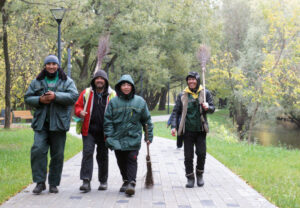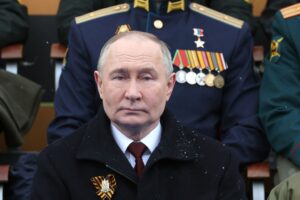A terror is stalking Europe. That, at least, is the impression you get from Kyiv. As Andriy Yermak, head of the country’s office of the president proclaimed, a new “axis of evil” is forming right across the planet, developing into a thoroughgoing military alliance that “challenges democracies and the world order”. And certainly, you can understand his fears to a point. North Korea, after all, is apparently planning to deploy some 10,000 troops to bolster Russia’s war effort, even as Pyongyang may now be supplying half of Moscow’s artillery shells.
Yet if a June 2024 agreement between the countries is certainly worrying, especially when dovetailed by Chinese sabre-rattling in the Pacific, the West is facing less an axis of evil than of convenience. The truth is that Vladmir Putin is deeply reliant on Kim Jong Un — and the help he’s getting from the hermit kingdom is basically a sign of weakness, not strength.
The sudden appearance of North Koreans in their country was unsurprisingly greeted by alarm in Kyiv. And considering how the conflict is going, Yermak’s dramatic language surely makes sense. Over the last few months, after all, the Russians have made grinding gains right across Ukraine, sometimes advancing as much as a kilometre a day and threatening strategically significant cities like Pokrovsk. To an extent, meanwhile, the recent alliance between Moscow and Pyongyang reflects a long-standing amity. The countries have enjoyed generally warm relations since Putin’s ascension to the presidency 25 years ago. Among other things, Pyongyang played host to one of the president’s first state visits abroad, when he hailed the Soviet army’s special role in “liberating” North Korea from Japanese occupation in 1945.
Nonetheless, Moscow issued firm condemnations of North Korea’s erratic and dangerous behaviour on the international stage in the mid-2000s, when Putin hoped to burnish his international reputation by playing mediator on the Korean Peninsula. No less important, the sweep of Russian history demonstrates the real balance of power between the two countries. During the early years of the Cold War, the North Korean regime relied on Soviet help to carve out territory. From there, it spent decades oppressing its population while dodging Soviet retaliation. While the Kim dynasty were never Russian pariahs, in other words, they were always treated as junior partners, to be praised or scolded as it suited Moscow.
Since his 2022 invasion, however, Putin has been desperate for partners wherever he can find them. Now, the president makes naked attempts to rewrite history and paint Russia and Korea as old and equal partners. The security partnership signed this year, and North Korea’s increasing provision of soldiers and shells, seem to suggest that equality is being embraced by both sides. Yet despite the pageantry of the official dinners, and the finesse of the PR statements, Putin is clearly desperate for Kim Jong Un’s support.
Notwithstanding recent Russia’s victories around places like Pokrovsk, that’s fundamentally down to its broad geopolitical frailty. Russia is today struggling with a deep crisis in military recruitment, fuelled mainly by the huge losses it’s suffered at the front. Each month, 30,000 men enter the military — and the same number are invalided home or killed on the battlefield. Despite the vast bonuses offered to contract soldiers who choose to enlist, which by some measures now account for 1.5% of the Russian spending, the state is still forced to scour the globe for mercenaries to support its war. A division of raw North Korean conscripts, ignorant of Russian and unfamiliar with their officers, would vanish if thrown into the Ukrainian meat grinder.
And if its reliance on North Korea speaks to a military problem, meanwhile, Russia also leans on the DPRK economically. Though the Kim regime can certainly manufacture shells in vast numbers, reportedly shipping some five million to its Russian allies, many appear to be badly made. The fact that Putin is accepting them anyway suggests that he has nowhere else to turn. That’s clear elsewhere: though Russia is now spending some 40% of its budget on defence, and refurbishing factories to pump out munitions, it remains totally reliant on external partners like North Korea. Despite boasting an economy some 10 times larger than North Korea’s, in short, Russia, seems incapable of waging an independent war on Ukraine — let alone launching an attack on Nato as part of some nefarious plot to explode the global order. Pyongyang, for its part, can only offer marginal support to their desperate Russian partner, assistance they’re anyway giving mainly to extract cash, scientific research, and other goodies.
Despite the ominous signs, then, the purported axis of evil probably shouldn’t worry Western leaders. On the contrary, the June alliance points to Moscow’s ever weaker position on the world stage. Putin, frantic to pick up whatever scraps of men and materiel he can, has been reduced to begging. And as soon as the North Koreans spot a better deal, particularly from China, they’ll have little incentive to remain loyal to Moscow. Should China demand or buy Pyongyang’s support for an invasion of Taiwan, Putin’s war will be forgotten in an instant.
Russia may win some small gains from its North Korean ally. But 10,000 troops — as unwelcome as their presence in Ukraine undoubtedly is — ultimately won’t change the course of the war. Yet if the world at large has little to fear from Putin and Kim’s fair-weather friendship, might the West have an opportunity here? If, after all, Kim Jong Un can be tempted to stop providing shells and soldiers to Moscow, either by China or a Western coalition, might an exhausted Russia be forced to retreat from Ukraine? Such a move won’t, of course, win the war alone. Re-supplying Ukraine’s own exhausted military is vital too. Yet squeezing Russia’s supply of weapons would surely hamper Putin’s ability to hold the line, or indeed prepare for another attack against Ukraine. Divided by ideological differences, and opposing medium-term goals, the new “axis of evil” is hardly an axis at all.
Disclaimer
Some of the posts we share are controversial and we do not necessarily agree with them in the whole extend. Sometimes we agree with the content or part of it but we do not agree with the narration or language. Nevertheless we find them somehow interesting, valuable and/or informative or we share them, because we strongly believe in freedom of speech, free press and journalism. We strongly encourage you to have a critical approach to all the content, do your own research and analysis to build your own opinion.
We would be glad to have your feedback.
Source: UnHerd Read the original article here: https://unherd.com/



